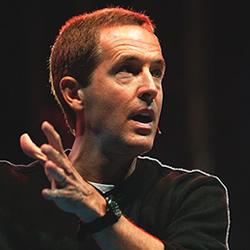I found this at http://www.edstetzer.com
Question: What is your philosophy of communication/preaching?
Andy: Preaching on Sunday mornings is such a simple thing and by complicating it, I think we all do ourselves and the audience a disservice. It is very simple. Here is the model: Make people feel like they need an answer to a question. Then take them to God’s Word to answer the question. And tell them why it is important to do what we just talked about. And then you close by saying, “Wouldn’t it be great if everybody did that?” And that’s it. It is a journey. You take people from somewhere to somewhere.
And that’s why preaching by points is a terrible model. Because points are not a journey. Points are points. But communication is: Here we all are. We all have a common need or desire. We all have something in common, and I am going to stay here until I make you feel the need to have it resolved. And then I am going to open God’s Word and resolve it. And I am going to take that and tell you what you need to do specifically. And then I am going to take a minute and talk about what the world would be like, how much better off we would all be, if we would all do what the Scriptures say. It is really that simple.
Anytime a person listens to a pastor or to any talk that is compelling, all those elements are there. And you feel like you have gone with somebody on a journey. You just need to learn to outline that way. So when they bring an outline, I say, “You didn’t make me want to know what you spent twenty minutes telling me, so you left the station without me. I didn’t really care. It really wasn’t that compelling.” So, give me one idea, not multiple ideas. Most sermons are too long. Most sermons cover way too much information. Most sermons could be series. I say that all the time. “Poor guy, he spent all week preparing. He has three sermons and gave them all in one rushed forty-minute time period. His three points should be three sermons. Just leave me with a thought. We will all come back next week, so there is no rush to get it all in in one week.”
So, it is simple. It is a journey. This morning I am going to start by making sure that I am going to leave the station and everybody knows where we are going. And they know why they need to go with me. And once I have built enough tension for someone to give a rip about what we are going to talk about, then I am going to take them to a passage of Scripture where somebody resolves or expresses that tension. And I am going to stay there long enough so hopefully they will go back that afternoon and they will say, “I understand this part of the Bible.” Then I am going to talk about what to do and what a wonderful world it would be like if we all just do this. It is really that simple.
We had Jeff Foxworthy come to our Christmas party for our staff several years ago. I sat there on the first row, and I can hardly breathe because I am laughing so hard. It went two hours and I sat there thinking: there were no points; he has no application; he has no outline that I am aware of. I have been sitting here for almost two hours, and he is talking about rednecks. And I am fully engaged. There is no takeaway. There is no value. There is nothing biblical. There are no visual aids. There is no video. And I am fully engaged for an hour and a half.
The reason I bring that up is: there is this myth that people say, “Sermons need to be short because people today have short attention spans.” That is totally irrelevant. People’s attention spans are as long as their engagement. If I’m engaged, I will sit and stay engaged until I have to go to the bathroom. The issue is: are people engaged, not how long is the sermon? Granted, there are things that determine how long worship services should be. But communicators need to figure out how well do they engage people, and they should not talk one word longer than people are engaged.
There are people like Jeff who can engage you for an hour and a half in your chair, and they should go an hour and a half. And there are other communicators who can’t keep you engaged for more than 15 or 20 minutes, and they shouldn’t talk longer than that. Because once I am disengaged, then I begin to process the information as: this is irrelevant; church is irrelevant; God is irrelevant; the Bible is irrelevant. And all of a sudden I am learning the opposite lesson. I am drawing conclusions that are opposite of what the communicator is trying to make me draw because I am disengaged. So, the issue is: how do you engage the audience? And one of the things I talk to our communicators about is: The outline is great; the stories are great. But how do you engage them? How do you make it feel like we are on a journey, not you are just up there giving me information.
 As for the question “Where was God?” I would like to share with you that I know God was with my family while this rampage was going on. My aunt and little cousin had just left the gas station 5 minutes before the lady was shot and killed there. My mom works across the street from that gas station at Samson Banking Company. They had just closed the curtains and were preparing to leave when the gunman began shooting at the gas station. My dad owns Samson Hardware and Supply just a block down main street from the gas station. He had walked out on the sidewalk to see what all of the noise was. He said it sounded like fireworks. Then he heard the phone ring inside the store and went inside to answer it. During this time the gunman came by his store shooting out the windows across the street. If my aunt and cousin had stayed five minutes longer, or my mom had left work a couple minutes earlier, or if the phone hadn’t rung… God was with my family and I am thankful. My prayers go out to all the victims families.
As for the question “Where was God?” I would like to share with you that I know God was with my family while this rampage was going on. My aunt and little cousin had just left the gas station 5 minutes before the lady was shot and killed there. My mom works across the street from that gas station at Samson Banking Company. They had just closed the curtains and were preparing to leave when the gunman began shooting at the gas station. My dad owns Samson Hardware and Supply just a block down main street from the gas station. He had walked out on the sidewalk to see what all of the noise was. He said it sounded like fireworks. Then he heard the phone ring inside the store and went inside to answer it. During this time the gunman came by his store shooting out the windows across the street. If my aunt and cousin had stayed five minutes longer, or my mom had left work a couple minutes earlier, or if the phone hadn’t rung… God was with my family and I am thankful. My prayers go out to all the victims families.  These are some notes I took from Andy Stanley’s talk at Catalyst One Day. I hope they are helpful.
These are some notes I took from Andy Stanley’s talk at Catalyst One Day. I hope they are helpful. These are some notes that I took from Craig Groeschel’s talk at Catalyst One Day. I hope they are helpful.
These are some notes that I took from Craig Groeschel’s talk at Catalyst One Day. I hope they are helpful. Many of us are doing everything in our power to make our relationships better. Husbands want to grow closer to their wives. Wives want to grow closer to their husbands. Parents want to grow closer to their teenagers. Teenagers want to grow closer to the person that they are dating. Deep down inside, we all know that our relationships could be better. We listen to Dr. Phil and Oprah. We read books on relationships. But we just don’t seem to be making much progress. I would like to suggest to you that maybe we are working on the wrong relationship. I believe that as you and the person that you are in a relationship with grow closer to God, the two of you will grow closer to each other. It is what I call the “Love Triangle” (see picture). I also believe that the “Love Triangle” explains why many of your relationships aren’t working. Perhaps you are really growing closer to God and the person that you are in a relationship with is either not a Christian or is not growing closer to God. You are moving in different directions. You are actually moving farther apart from each other. This is why relationships between Christians and non-Christians rarely work out. I hope that the “Love Triangle” will help you better understand and evaluate your relationships. I would love for you to leave a comment about this post.
Many of us are doing everything in our power to make our relationships better. Husbands want to grow closer to their wives. Wives want to grow closer to their husbands. Parents want to grow closer to their teenagers. Teenagers want to grow closer to the person that they are dating. Deep down inside, we all know that our relationships could be better. We listen to Dr. Phil and Oprah. We read books on relationships. But we just don’t seem to be making much progress. I would like to suggest to you that maybe we are working on the wrong relationship. I believe that as you and the person that you are in a relationship with grow closer to God, the two of you will grow closer to each other. It is what I call the “Love Triangle” (see picture). I also believe that the “Love Triangle” explains why many of your relationships aren’t working. Perhaps you are really growing closer to God and the person that you are in a relationship with is either not a Christian or is not growing closer to God. You are moving in different directions. You are actually moving farther apart from each other. This is why relationships between Christians and non-Christians rarely work out. I hope that the “Love Triangle” will help you better understand and evaluate your relationships. I would love for you to leave a comment about this post.  Relationships… We all have them… Relationships with parents, children, friends, spouses, co-workers, employees, bosses, teachers, boyfriends/girlfriends, etc… The greatest joys that we experience in life come through our relationships. The deepest pains that we experience in life come through our relationships. We are who we are today because of the relationships we have been in up to this point in our lives. To say the least, relationships are extremely important. This is why beginning Sunday, March 1st Bro. Don and I will be doing a 6 week series called “Relationship Revolution”. We will be looking at what JESUS said about relationships. Our hope is that this series will revolutionize your relationships. Here is a list of the topics that we will be looking at:
Relationships… We all have them… Relationships with parents, children, friends, spouses, co-workers, employees, bosses, teachers, boyfriends/girlfriends, etc… The greatest joys that we experience in life come through our relationships. The deepest pains that we experience in life come through our relationships. We are who we are today because of the relationships we have been in up to this point in our lives. To say the least, relationships are extremely important. This is why beginning Sunday, March 1st Bro. Don and I will be doing a 6 week series called “Relationship Revolution”. We will be looking at what JESUS said about relationships. Our hope is that this series will revolutionize your relationships. Here is a list of the topics that we will be looking at: